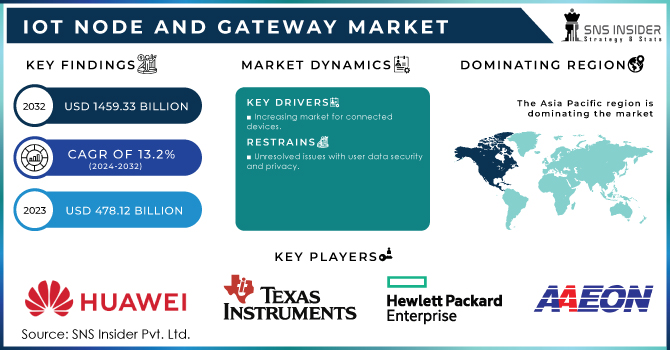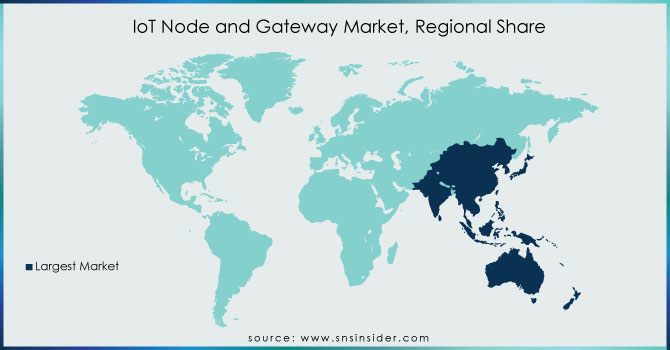IoT Node and Gateway Market Size:

Get more information on IoT Node and Gateway Market - Request Sample Report
The IoT Node and Gateway Market Size was valued at USD 478.12 billion in 2023 and is expected to reach USD 1459.33 billion by 2032 and grow at a CAGR of 13.2% over the forecast period 2024-2032.
The global IoT node and gateway market size is growing exponentially and is expected to grow significantly in the next few years. IoT node and gateway devices & software perform important functions in areas such as data security and filtering, protocol conversion, device connectivity, and more. Since most third-party systems include devices, controls, sensors and clouds, it acts as their integration. Therefore, additional security, storage, and processing services in storage facilities are provided at a more efficient and less expensive level with the use of IoT node and gateway. In addition, various communication technologies are used to facilitate nodes to communicate to each other within the network.
IoT Node and Gateway Market Dynamics:
KEY DRIVERS:
-
Increasing market for connected devices.
-
Data centers are becoming more and more essential as cloud computing platforms gain popularity.
-
Rise of 5G technology.
RESTRAINTS:
-
Unresolved issues with user data security and privacy.
-
High market fragmentation as a result of divergent communication standards and protocols.
OPPORTUNITIES:
-
Government funding for IoT technology research and development.
-
Cross-domain collaborations.
CHALLENGES:
-
IoT project implementation is delayed as a result of connection problems and a lack of IoT-related expertise.
-
IoT requires licensed spectrum for wireless devices.
IMPACT OF COVID-19:
The IoT node and gateway market have had a significant impact due to the outbreak of COVID-19. Global factories have struggled to create and integrate a new IoT node and gateway as workers are sitting in their houses and even equipment already available in various warehouses cannot be moved due to current laws and regulations that have disrupted the global supply chain. Due to the outbreak of COVID-19, technology will be one of the priorities for people, so the need for IoT node and gateway to various applications such as health care, safety, wearable and more will grow significantly. The impact of COVID-19 on the IoT node and gateway market is temporary as long as the production and acquisition of goods has stopped. Once the situation improves, the production, supply chain and demand for these batteries will gradually increase. This is expected to provide opportunities for companies to think about ways to increase productivity, research on technologies, and develop current products.
IoT Node and Gateway Market Segment Overview:
Based on Hardware, the IoT Node and Gateway Market is segmented into Sensor, Memory Device, Processor, Connectivity IC and Logic Device. The connectivity IC component holds the largest share of the IoT node and gateway market, depending on the volume. The growing demand for connectivity for better edge devices connectivity and significant developments in low-power connectivity technologies, such as Wi-Fi, Bluetooth, and Bluetooth Low Energy (BLE), are key factors that support the growth of the connectivity IC component.
Based on End Use Application, the IoT Node and Gateway Market is segmented into consumer and industrial. Consumer segment holds the largest share of the entire IoT node and gateway market during forecasting. With the advent of more consumer-oriented consumer electronics and smartphones, the growth of IoT technology in the consumer electronics segment is expected to improve.
IoT Node and Gateway Market Regional Analysis:
APAC is expected to record the highest growth in the IoT node and gateway market during the forecast period from 2023 to 2030. Growing Internet penetration in all commercial and residential areas, a comprehensive customer base, increasing revenue, and improving IT infrastructure. are some of the key decisions that add to the growth of the IoT node and gateway market in the APAC. In addition, the adoption of cloud-based services and the growing automation of industry automation are the mainstays of IoT node and gateway market growth for commercial applications in countries such as China, South Korea, and Japan.

Need any customization research on IoT Node and Gateway Market - Enquiry Now
KEY PLAYERS:
The key players in the IoT Node and Gateway market are Huawei Technologies, Texas Instruments Incorporated, Hewlett Packard Enterprise, Aaeon Components, Dell Technologies, Intel Corporation, NXP Semiconductor, Cisco Systems, TE Connectivity, Advantech & Other Players.
| Report Attributes | Details |
|---|---|
| Market Size in 2023 | USD 478.12 Billion |
| Market Size in 2032 | USD 1459.33 Biilion |
| CAGR | CAGR 13.2 % From 2024 to 2032 |
| Base Year | 2023 |
| Forecast Period | 2024-2032 |
| Historical Data | 2020-2022 |
| Report Scope & Coverage | Market Size, Segments Analysis, Competitive Landscape, Regional Analysis, DROC & SWOT Analysis, Forecast Outlook |
| Key Segments | • By Hardware (Sensor, Memory Device, Processor, Connectivity IC, Logic Device) • By End Use Application (Consumer, Industrial) |
| Regional Analysis/Coverage | North America (US, Canada, Mexico), Europe (Eastern Europe [Poland, Romania, Hungary, Turkey, Rest of Eastern Europe] Western Europe] Germany, France, UK, Italy, Spain, Netherlands, Switzerland, Austria, Rest of Western Europe]), Asia Pacific (China, India, Japan, South Korea, Vietnam, Singapore, Australia, Rest of Asia Pacific), Middle East & Africa (Middle East [UAE, Egypt, Saudi Arabia, Qatar, Rest of Middle East], Africa [Nigeria, South Africa, Rest of Africa], Latin America (Brazil, Argentina, Colombia, Rest of Latin America) |
| Company Profiles | IoT Node and Gateway market are Huawei Technologies, Texas Instruments Incorporated, Hewlett Packard Enterprise, Aaeon Components, Dell Technologies, Intel Corporation, NXP Semiconductor, Cisco Systems, TE Connectivity and Advantech. |
| Key Drivers | •Increasing market for connected devices. •Data centers are becoming more and more essential as cloud computing platforms gain popularity. |
| Market Restraints | •Unresolved issues with user data security and privacy. •High market fragmentation as a result of divergent communication standards and protocols. |

